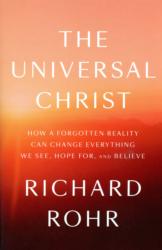 “The Universal Christ”
“The Universal Christ”
by Father Richard Rohr, OFM.
Convergent Books (New York, 2019).
260 pp., $26.
“A mature Christian sees Christ in everything and everyone else,” Franciscan Father Richard Rohr writes in “The Universal Christ.” But to achieve such maturity, it is vital that Christians know who Christ is. It is time, the author suggests, to come to terms with what the full title “Jesus Christ” implies.
“Is Christ simply Jesus’ last name? Or is it a revealing title that deserves our full attention?”
[hotblock]
That basic question at the heart of “The Universal Christ” might lead some prospective readers to fear that this is a dense theological tome. It is not.
I found it much more an inviting work of spirituality aiming to guide Christians toward greater faith maturity than a doctrinal treatise. “God loves you” and constantly gives you “back to yourself in a larger shape,” the author states.
After all, Christian faith affirms the possibility for individuals and communities to become transformed. It is possible to mature, to change in ways that enable us “to see with God’s eyes,” to “enjoy all things in proper and full perspective,” Father Rohr indicates.
A Franciscan priest of his order’s New Mexico province, Father Rohr founded the Center for Action and Contemplation in Albuquerque. Some of his other books include “The Divine Dance” and “Falling Upward.” He grounds his work, it is explained, in contemplative practices that encompass “radical compassion, particularly for the socially marginalized.”
The transformation he envisions for Christians might involve a rewiring for “love, trust and patience.” It might entail a recalibration or change of course in life.
[tower]
But challenges are sure to be encountered in negotiating the pathways to Christian transformation, and they are what make this book’s spirituality dimension stand out for me. Consider the author’s recommendation that people work up to loving God by starting at the bottom of the ladder, so to speak.
“Don’t start by trying to love God or even people; love rocks and elements first, move to trees, then animals and then humans.” Advancing step by step, God finally will be “just a short leap away,” Father Rohr explains.
He observes helpfully when discussing transformation that “all of us travelers, each in our own way, have to eventually learn about letting go of something smaller so something bigger can happen.” Perhaps “you decide not to push yourself to the front of the line, and something much better happens in the back of the line,” he writes.
His book offers a few cautionary words for reflection, particularly involving images of an angry God. How punitive might I become toward others if a punitive divine hand typically assumes the front-and-center position in my image of God?
Christians are meant “to stand in radical solidarity with everyone and everything else,” Father Rohr makes clear. Perhaps anticipating criticism for holding that God is present in everything, the author clarifies that he is not a pantheist.
Rather, he says, “I am really a panentheist (God lies within all things, but also transcends them), exactly like both Jesus and (St.) Paul.” Father Rohr has said his book “isn’t changing a single doctrine of the church.”
His book’s subject is “the evolving, universe-spanning Christ mystery in which all of us take part.” Humanity today needs “a Jesus we can practically imitate and who sets the bar for what it means to be fully human. And a Christ who is big enough to hold all creation together in one harmonious unity,” he comments.
One of his great concerns is that the connections among all people risk being eclipsed if faith in Jesus Christ shortchanges his reality as Christ. Father Rohr believes “there has never been a single soul who was not possessed by the Christ, even in the ages when Jesus was not.”
[hotblock2]
But history shows “that worship of Jesus without worship of Christ invariably becomes a time- and culture-bound religion, often ethnic or even implicitly racist, which excludes much of humanity from God’s embrace,” Father Rohr asserts.
He may be right. I suspect, at the same time, that the human tendency to exclude “the other” or to refuse to welcome the stranger will find ways of rising to the surface, no matter the prevailing theology. But this tendency’s persistence is perhaps the topic for another full book.
For Father Rohr, “the Christian life is simply a matter of becoming who we already are.” However, “we have to awaken.” He hopes this will be an awakening to the meaning and the connections of everyone, and even of everything.
“In Jesus Christ,” he explains, “God’s own broad, deep and all-inclusive worldview is made available to us.”
***
Gibson was the founding editor of Origins, Catholic News Service’s documentary service. He retired in 2007 after holding that post for 36 years.
PREVIOUS: ‘Chasing the Moon’ offers surprises in Apollo 11’s story
NEXT: Rare exhibit of Jesuit artists’ work in China displayed in Washington


Share this story